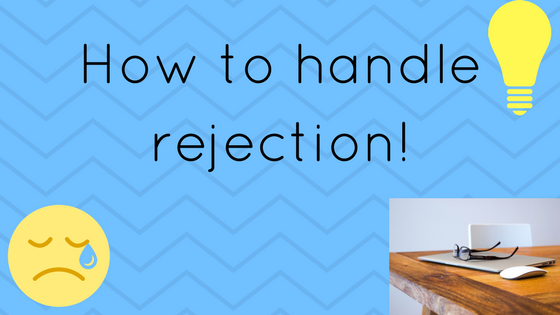How to handle the phrase: ‘unfortunately, you have not been accepted’
That phrase is everywhere: work placements, internships, training, competitions, part-time and graduate jobs. The emotions you experience when the email that you’ve been waiting weeks for finally drops into your inbox is parallel only to a roller-coaster. Fear of the notification, elation that they’ve finally gotten back to you… and then sadness, to hear that you didn’t get accepted. 🙁
How to deal with it
Everyone gets rejected. It’s a fact of life. Some people experience more rejections than others, and it’s a common trait that we start to compare ourselves. So firstly, stop comparing yourself. You got rejected from five graduate jobs, whereas your old roommate has literally waltzed into hers without even having an interview. Well good for her. She’s not you.
You can be sad. You put a huge amount of effort into that job application, and now the 4am bedtimes and the hours ploughed into perfecting your CV and personal statement seem pointless. Allow the tears to flow, but not for long.
Eventually, you’re going to have to get back on the saddle. Since rejection is a fact of life, it’s undoubtedly going to happen again. Start to develop a thicker skin. People have faced hundreds of rejections before finally getting where they want to be in life. You need to do the same. Stare into the eyes of that rejection and make peace with it. It’s not the end of the world.
Take the feedback
I got rejected from six internships and one work experience opportunities at Penguin Random House, within a 5 hour period. I’m not ashamed to say I cried a lot. To work at Penguin was my dream, still is, and to say that I was heartbroken is an understatement. After the tears had dried, I read my feedback, and so should you.
Although they rejected you, employers will often offer feedback. If they don’t, you can ask for it. Ensure that you address them professionally and politely. Never send a negative email or scream down the phone to the poor person working in HR, no matter how upset you are. That will get you nowhere.
If your feedback was vague or generic, look at how you marketed yourself. Tailor your CV to the job; make sure your personal statement is full of glowing reviews of yourself. Practice your interviewing skills. If unsure, go back to basics.
The feedback is there to get you on the right path. For example, Penguin said I didn’t have enough experience, so I started to write for my university’s blog. Use the rejection to your advantage. Take it as an opportunity to better yourself. Think of it as falling at a hurdle, all you need is a better run up!
Improve your Employability
It seems like such an obvious thing to do, but improving your skills and gaining experience can really help you get your foot in the employment door. You may have been rejected because you don’t have enough experience, like me with Penguin. This isn’t a bad thing, employers only want people who know what they’re getting themselves into. It wouldn’t be sensible to employ a doctor who had never seen a wound before, now would it?
“But I wouldn’t be able to get relevant experience for the job I want,” I hear you cry! No. Most, if not all experience is relevant, you just have to make sure you tailor your experience to the job specifications in your CV.
For example, if you want to be someone who works with confidential or sensitive information, such as a counsellor, you wouldn’t be able to get experience in that workplace until you became employed. You can always find experience elsewhere. Taking the counselling job as an example: you could raise money for the charity Mind, or you could volunteer on a mental health helpline, or raise awareness about mental health at your university. You’re not working in the desired environment, but these experiences show you are passionate, empathic and driven towards that area of work.
Gaining new skills and having new experiences aren’t the only way to improve your employability. Social media is a huge tool for both students/graduates and employers. It goes back to how you market yourself. Depending on the job you want, you could start your own blog. Or you could network with other people in your desired industry through Twitter and Facebook. Having a professional LinkedIn profile is another way to advertise yourself to employers and even get job offers.
Of course, your social media could be the thing that made employers decide to reject you. If you have drunken pictures of yourself splashed all over Facebook then employers might be able to find these. Same goes with any crude remarks, insensitive jokes and foul language that you’ve used on Twitter. It doesn’t matter that it was made in the heat of the moment when you saw that your lazy housemate didn’t clean their dishes again. All of this can be found, and if employers don’t like what they see on your social media, then you’ll instantly be rejected. Ensure all social media is clean and appropriate, and if you need to express some rage, go scream at the ducks in the pond.
Best of luck with all of your applications.
Never give up!
Charlotte Brindley | Careers Ambassador | YSJ

